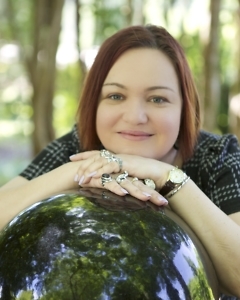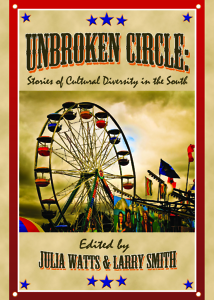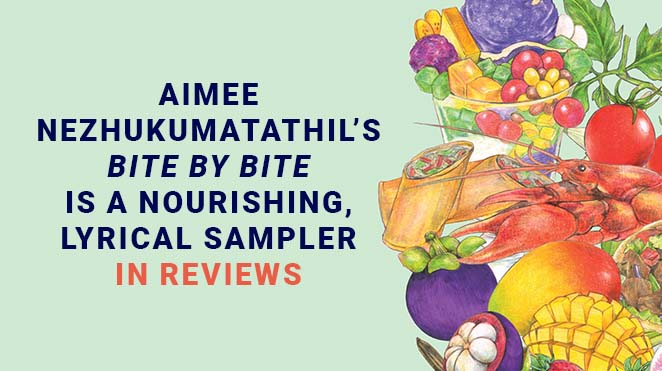When Knoxville writer Julia Watts and Larry Smith, a writer from the Ohio River Valley, set out to collect short works that would challenge stereotypes of Southerners, they were aware of how contentious American culture had become. “In a time when many people have lost the ability to listen and empathize,” Watts writes, “we … invite you to pull up a chair, join our circle, and listen to our stories.” Owing to “some deep questioning and brave sharing,” the result is Unbroken Circle: Stories of Cultural Diversity in the South, an anthology intended to reflect a broader picture of Southern experience and encourage readers to push beyond cliché.
 The Southerners represented in these pieces are largely people who view themselves as outliers. In one form or another, they have undertaken to carve out for themselves—in work, love, and family—lives that provide some small haven from hostile surroundings. Winter, the teenage protagonist of “Feast of the Sun” by East Tennessee writer Charles Dodd White, finds her private haven during mountainside hunting jaunts that seem almost like meditations. She may struggle to connect with her father’s latest girlfriend on a shopping trip, but the woods are waiting for her, giving her something vital and necessary. For Okey Napier, who details a loving friendship in “Dave,” that haven is found backstage at a drag show in West Virginia. Touching up his drag persona (Miss Ilene Over) in the dressing room, he meets Dave (Dawnita) and embarks on a friendship defined by nurturing, loss, and generosity.
The Southerners represented in these pieces are largely people who view themselves as outliers. In one form or another, they have undertaken to carve out for themselves—in work, love, and family—lives that provide some small haven from hostile surroundings. Winter, the teenage protagonist of “Feast of the Sun” by East Tennessee writer Charles Dodd White, finds her private haven during mountainside hunting jaunts that seem almost like meditations. She may struggle to connect with her father’s latest girlfriend on a shopping trip, but the woods are waiting for her, giving her something vital and necessary. For Okey Napier, who details a loving friendship in “Dave,” that haven is found backstage at a drag show in West Virginia. Touching up his drag persona (Miss Ilene Over) in the dressing room, he meets Dave (Dawnita) and embarks on a friendship defined by nurturing, loss, and generosity.
Though readers have reason to expect more writers of color to be represented in an anthology overtly devoted to cultural diversity, the voices in these pages represent a wide variety of experiences. In particular, many essays and stories convey the struggles of LGBT Southerners to create supportive spaces for one another. At moments of triumph (like the Supreme Court’s recognition of same-sex marriage) or during more vulnerable times (like familial rejection), these protagonists offer moving accounts of how home and community might be remade, sometimes on the fly.
 Unbroken Circle contains a number of personal essays which detail a search for Southern identity amid confusing or oppressive influences. Anna Cabe’s “Two Fountains” recounts her upbringing as a Filipina girl in Greenwood, Mississippi. Gradually awakening to the uneasy differences between her and her classmates, Cabe is eager to flee the South, only later finding that the foods and the accents of her youth assuage a specific kind of longing nothing else can touch.
Unbroken Circle contains a number of personal essays which detail a search for Southern identity amid confusing or oppressive influences. Anna Cabe’s “Two Fountains” recounts her upbringing as a Filipina girl in Greenwood, Mississippi. Gradually awakening to the uneasy differences between her and her classmates, Cabe is eager to flee the South, only later finding that the foods and the accents of her youth assuage a specific kind of longing nothing else can touch.
Jeff Mann describes the evolving tradition of a very personal kind of Southern hospitality in “Big Queer Convocations,” which he wrote in the wake of the Pulse club shooting in Orlando. Never totally at ease in the bar scene of his youth, Mann is drawn back to his tiny hometown as he and his husband begin to crave safe, cozier gatherings for themselves and close friends. Mann enjoys thinking of the resulting “Big Queer Convocations” as “the Southern Appalachian version of Gertrude Stein and Alice B. Toklas’s salons in Paris.” In essays like these, Southern identity proves a resilient yet evolving force within each writer’s life.
Unbroken Circle opens with an epigraph attributed to the Tewa Indians, which defines “the great Circle of life” as a place of unity and equality: “No one is in front of you, no one is behind you. No one is above you, no one is below you.” The strength of this collection lies in the sense that every person’s inner world is worth exploring—in all its specificity and humanity.

Emily Choate holds an M.F.A. from Sarah Lawrence College. Her fiction has been published in Shenandoah, The Florida Review, Tupelo Quarterly, and The Double Dealer, and her nonfiction has appeared in Yemassee, Late Night Library, and elsewhere. She lives in Nashville, where she’s working on a novel.
Tagged: Fiction, Nonfiction





